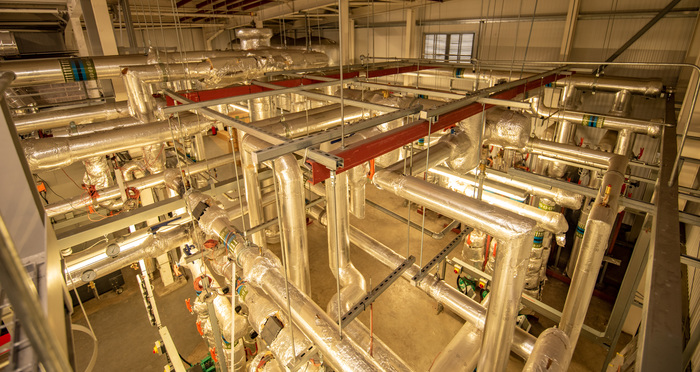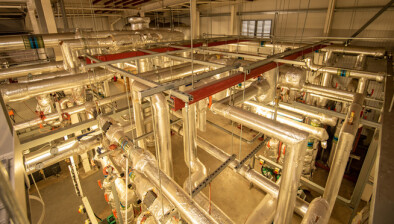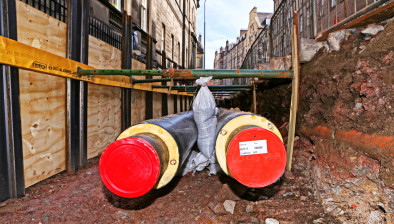Heat Networks (Scotland) Bill passed by MSPs
Legislation which will help cut emissions, reduce fuel poverty and create green jobs by accelerating the deployment of heat networks has been passed unanimously by the Scottish Parliament.

Scotland is the first country in the UK to legislate to support the growth of heat networks, through which clusters of homes and businesses get heating from a central source rather than individual fossil fuel boilers - making it safer for customers and more efficient.
The Heat Networks (Scotland) Bill creates a new licensing system to drive up standards across the sector, improving consumer confidence. It also creates new rights for heat network developers and operators to level up the playing field with other utilities in order to make investment in the sector more attractive and encourage further growth.
A new consent system will also be introduced to make sure that new networks are developed in areas where they will have most benefit and are tailored to its needs.
Detailed guidance and regulations required to implement the Bill will be developed over the next two years.
It is estimated that heat networks will reduce greenhouse gas emissions by the equivalent of 90,000 cars by 2050 and generate annual fuel savings of around £130 for every household that connects to a heat network. A National Comprehensive Assessment (NCA) is being undertaken to establish the technical and cost-competitive potential for heat networks. It is expected that this UK-wide analysis, due to be published in the Spring, will indicate that deployment of heat networks can deliver environmental benefits on a greater scale than currently projected.
Energy minister Paul Wheelhouse said: “The Scottish Government’s commitment to helping ensure Scotland becomes net-zero by 2045 is unwavering. We understand the decarbonisation challenge we face in order to end our contribution to climate change, not least in decarbonising heating in our homes and buildings, which currently accounts for 30% of Scotland’s total energy consumption.
“Heat networks have huge potential to reduce emissions in our homes and buildings by providing more efficient, environmentally-friendly solutions. The Heat Networks (Scotland) Bill – the first legislation of its kind in the UK - unlocks this potential, and marks the beginning of what will be a period of transformational change in how we heat our homes and business premises.
“As we continue to grapple with the unprecedented challenges of the coronavirus (COVID-19) pandemic, we know that we urgently need to stimulate our economy. Heat networks fit the profile of the sort of project that can make a significant, near-term contribution to our green recovery while providing long-term employment in local communities. The development of this sector will, crucially, provide ongoing support to achieve our target to reach net zero greenhouse gas emissions by 2045.
“Scotland has the most ambitious legislative framework for emissions reduction in the World, which is why we have also, through this Bill, set stretching targets for the expansion of heat networks to ensure that we build early momentum and give as much clarity to potential suppliers as we can. Our targets are undoubtedly ambitious – targeting the equivalent of 650,000 homes to be connected to heat networks by 2030, from the current number of 32,000, will require a very significant expansion of the supply chain – but I am confident our Heat Networks Bill lays strong foundations for this ambition to be met.”
Citizens Advice Scotland (CAS) has welcomed the passage of the Bill which it said will help protect consumers.
In particular, CAS has welcomed the bill’s inclusion of measures that will protect house-holders from problems when heat networks fail to work effectively.
Kate Morrison, CAS fair markets spokesperson, said: “We are pleased that the Parliament has passed this bill, which is an important step towards reducing fuel poverty and also reaching Scotland’s net-zero emissions targets.
“Heat networks are a great idea in principle because they can reduce the fuel bills in the homes within the network while also cutting the amount of harmful emissions. However, they sometimes go wrong in practice, and when they do it is often the consumers who suffer.
“The Scottish CAB network sees first hand the types of issues that can face house-holders when this happens and we have long called for better regulation of the sector. We believe heat network consumers should be afforded the same service standards and protections as consumers of the gas and electricity markets – which are well-regulated. This bill takes important steps in that direction.
“We are especially pleased to see that, following our recommendations, the principles of community engagement and ‘just transition’ are included on the face of the bill, as this follows the positive trend of increasing the rights of communities to be involved in decisions that affect them.
“When done well, community engagement delivers both community and organisational benefits. Good planning and preparation on the part of a heat network can help providers identify consumers who are struggling with bills early and act to help them avoid falling into fuel poverty and accumulating fuel debt.”
















